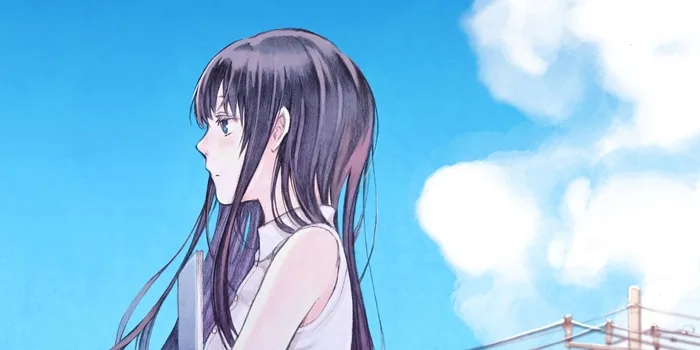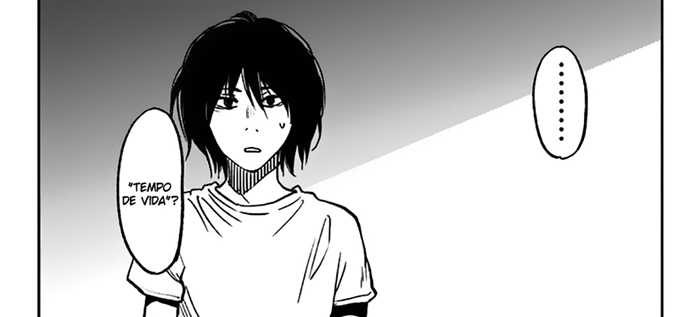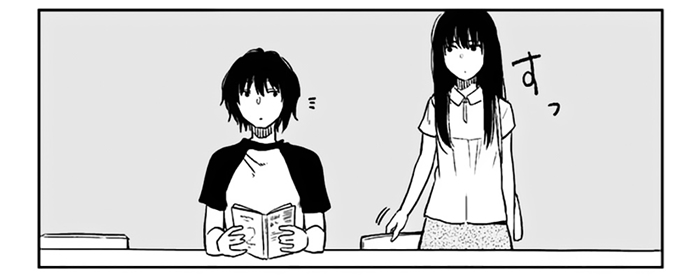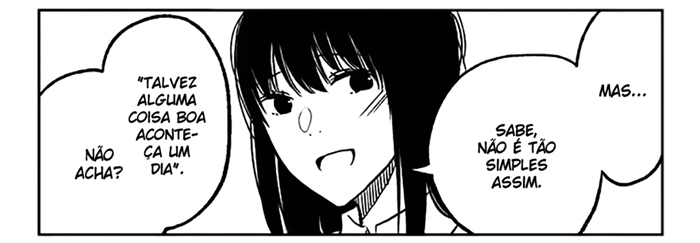Jumyou wo Kaitotte Moratta. Ichinen ni Tsuki, Ichimanen de. Ou I sold my life for ten thousand yen per year ( free translation “I sold my life for ten thousand yen per year” ) is a manga adaptation inspired by the novel Three Days of Happyness ( Mikkakan no kōfuku ) by author Sugaru Miaki , published in 2013 by ASCII Media Works .
Romance and drama without clichés

Warning! Spoilers in this text!
The relatively short story, with only 18 chapters, is a painful and delicate journey about the true value of someone's happiness.
The world can be an inhospitable place for some people; unfortunately, this is a reality we cannot escape. Jumyou wo Kaitotte Moratta tells the story of Kusunoki , a young man in his twenties who is parting with his last valuable possessions because he doesn't even have enough money to eat.
However, an old man notices Kusunoki's poverty and tells him about a shop that supposedly buys lifespan, time, and health. He doesn't quite believe the old man's words, but in his state of desperation and a bit of curiosity, Kusunoki decides to go to the address.
At the shop, he is greeted by a girl who will assess the value of his remaining time. Kusunoki is anxious for the answer but is soon crushed by the cruel truth: the value of his remaining time is 300,000 yen ( approximately R$15,000 ). Even so, he decides to sell his 30 years of life for 10,000 yen per year, leaving Kusunoki with only 3 months left to live.
After returning home with the money, he is greeted by an unexpected visitor, the same person who appraised the value of his life at the mysterious shop. She introduces herself as Miyagi , and says her job is to watch over him until his last three days of life .
How does the system of selling life work?
This aspect isn't explored much; it's possible to sell lifespan, time, and health, even to maintain the mystery of the plot in this regard, but the process isn't as difficult as it seems.
In manga, the value of someone's life time lies in how much happiness they will have, how many people they will make happy, how many things they will accomplish in their life, and how much they will contribute to society; in short, these are the determining factors.
Simply put, it's about how much your life would be worth to yourself and to others—a lot or a little?
A bittersweet story
Jumyou wo Kaitotte Moratta is a heavy experience, despite everything Kusunoki is going through he seems so numb to his way of life that he can't show what he feels, even though he's in his twenties he often shows his emotions like a child, becoming speechless in some situations, asking questions to Miyagi and other characters.
Firstly, Miyagi is a very suspicious figure, shrouded in mystery about how things work. But her personality isn't very different from Kusunoki's. The only difference is that Kusunoki is eager to live out her final days, while Miyagi is focused on work.
Kusunoki is literally on his deathbed, and like anyone else, he would like to settle his unfinished business. The first panel of the manga tells of his childhood friend and his promise to meet her after 10 years to be together, something innocent and dear.
The encounter between him and his friend is an uncomfortable situation for the reader, as Kusunoki is about to die and has begun to loosen up a bit from social constraints and no longer cares about certain things, thus being true to himself, but making the encounter with his friend extremely strange.
His view of her is very distorted and once again brings to the surface his childish way of seeing things, but in the end he has a revelation that brings him a little closer to reality, realizing that neither of them are children anymore.
After that, his relationship with Miyagi begins to deepen little by little, with him talking more about his wishes before he dies, and she sympathizes with him and decides to help him pass the time.
The beloved invisible girl Miyagi
Miyagi has a very complex past that led her to work for the mysterious shop, which has left her as numb to reality as Kusunoki.
Her relationship with Kusunoki eventually blossoms into love, showing that even in that situation, good things can flourish. But for Miyagi, this love is much more painful than for Kusunoki, after all, she is loving someone who is on the path to death.
Miyagi often says that Kusunoki is cruel, and she herself knows that these feelings will destroy her after he's gone.
This dramatic development is interwoven with lighter elements throughout the chapters, giving the feeling that, despite everything, the present is what matters most. However, the ending is certainly surprising, reminiscent of the rules the manga established at the beginning of the story to develop a bittersweet conclusion.
"Before my feelings reach a point of no return... Before I think it's impossible for me to separate from him, please... I pray that Kusunoki-san can die at least one second sooner."
Final considerations
Jumyou wo Kaitotte Moratta is not for amateurs, touching on heavy subjects and often leaving the reader uncomfortable, showing how life can be distressing and empty, but also presenting many loving moments or, as Miyagi says, cruel moments.
Despite having a high rating on most aggregators, the manga is very divisive among readers, with some people hating the story and others loving it.
The novel was adapted into a manga by mangaka Suzuka with art by illustrator Shouichi Taguchi , which isn't a masterpiece in itself, but conveys the scene's needs very well, with light lines and simple expressions. The manga was published by Shueisha on the Shonen Jump+ app between 2016 and 2017, with 3 printed volumes published.
The manga images used in this analysis were translated by Kuro to Shiro Scans .




